Jeju Island: Why You Should Visit Yakcheonsa Temple
Last Updated on November 7, 2023
There are many beautiful sites on Jeju Island to visit and among them is the gorgeous Yakcheonsa Temple (약천사). This beautiful Buddhist temple on Jeju Island is not old in any sense of the word though. Located on the south western coast of Jeju Island, surrounded by other tourist hot spots, it’s an easy addition to any Jeju itinerary and a great place to take a rest. If you’re staying in Seogwipo City, this is a must-see when you visit.
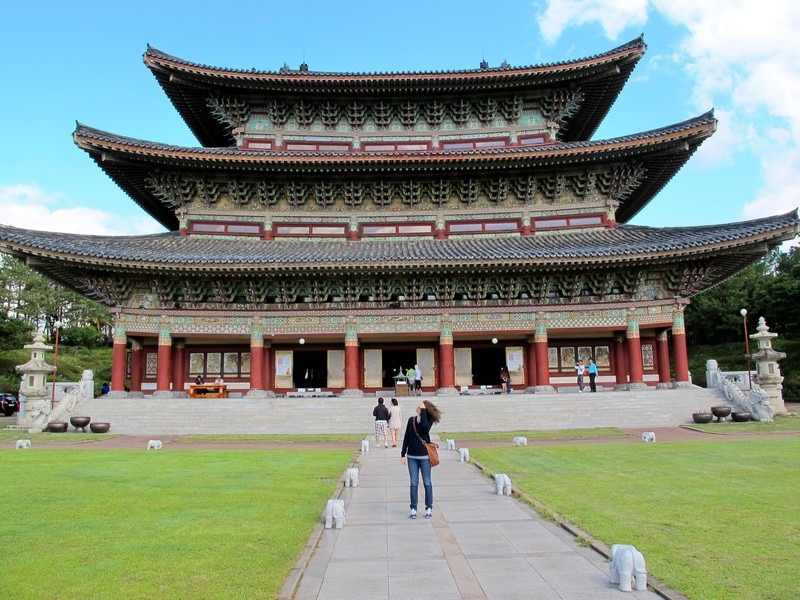
Here is all of the information you need to visit Yakcheonsa Temple:
- How To Get Around Jeju Island
- How To Get To Yakcheonsa Temple
- Basic Info
- The History of Yakcheonsa Temple
- What You Can See
(This page contains affiliate links. That means if you click on them and purchase something, I will get a percentage of the transaction at no cost to you. Thanks for the support!)
How To Get Around Jeju Island
Jeju Island is NOT the easiest to get around if you’re trying to travel via public transportation. This is why choosing where you want to stay and what you want to see before you go is oh so important. It’s easy to get to, but once you’re there, you’ll probably want to rent a car if you want to see and do more. For Yakcheonsa Temple, it’s definitely an easier excursion if you’ll have a car but it’s not impossible to get there via public transport and a little walk.
Rent A Car: Renting does not have to be a hassle. If you don’t want to go directly with a local shop, check out Klook which offers a great deal on rental cars and works really well for tourists. It’s fast and efficient and you’ll land and be on the road in no time. For more information and options, check out this guide for how to rent a car in Jeju.
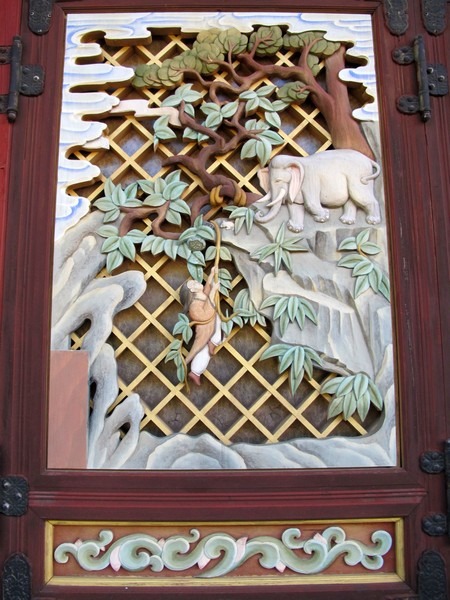
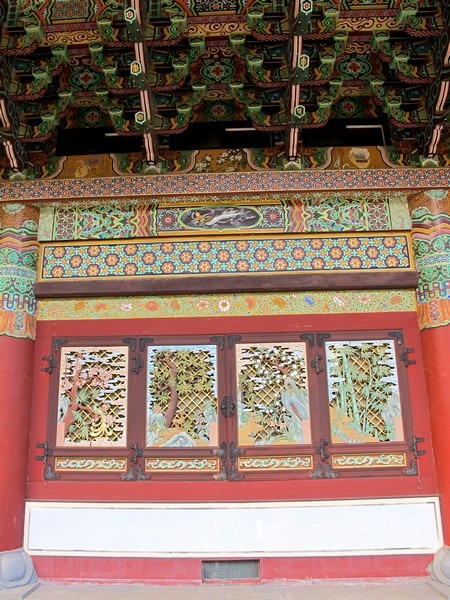
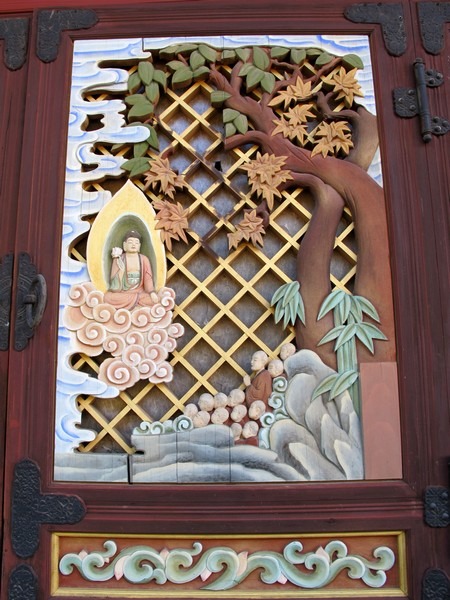
How To Get To Yakcheonsa Temple
Address: 1165 Daepo-dong Seogwipo, Jeju, Korea(서귀포시 대포동 1165)
By Bus: From the airport, you can take bus 181 or 182 to get off at Jungmun Highschool. From there, you’ll have to walk or taxi the last 1.3 kilometers toward the coast to find the temple.
By Tour: This temple is in the south and Klook has a great tour that includes this with some other must see spots nearby including a massive waterfall you need to see to believe.
Basic Info
Hours: 7:00am ~ 6:00pm
Admission: Free
Facilities: Parking lot, restrooms
Website: www.yakchunsa.org
Temple Stay Program: If you want to do more than visit, there are templestay opportunities at Yakcheonsa Temple as well that happen on the first and third weekend of the month. There is also a longer three day traditional culture program that is offered every forth Friday, Saturday, and Sunday.
Olle Trail Stop: Yakcheonsa forms part of two Olle trekking trails; the start point of Olle 7 and the finish point of Olle 8. If you will be walking the Olle Trails of Jeju, then look out for this stop on the way.
The History Of Yakcheonsa Temple
Only recently built, it has a short history, though one cannot tell from the architecture as it was built in the style of Buddhist temples of the early Joseon Dynasty. The temple is located on a site where a mineral spring flows from the ground which has been known about for a long time. Prior to the temple, there was a hermitage called Yaksuam located in the place where the temple is now.
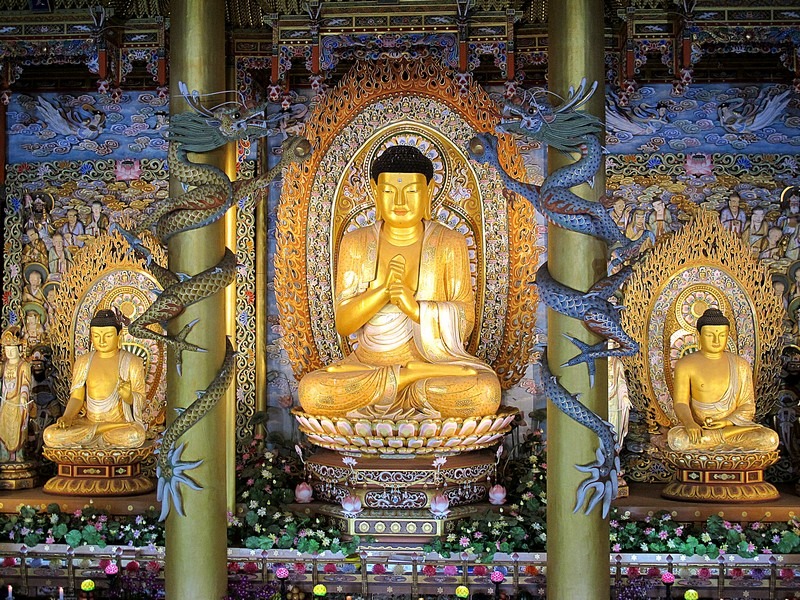
For centuries, locals in the region had called the site of the spring “Dwaeksaemi,” a Jejudo word meaning “a mineral spring with good quality water.” According to another story, in the 1960s, a Confucian scholar named Kim Hyeong-gon was praying for 100 days in a small cave. He drank some mineral water given to him in a dream and recovered his health. He then built Yaksuam to express his gratitude to the Buddha and did his Buddhist practice there until the end of his life.
Construction on Yakcheonsa began in 1982, and the 30 meter high Daejeok-gwangjeon was built to include a basement. Then a three-story dormitory, also with a basement, was built with passageways that connect to Daejeok-gwangjeon. That dormitory also has a dining hall and concession stand that sells basic necessities. Eventually, an underground Dharma hall, a Samseonggak, a pagoda to enshrine relics, large fountains and a pond were also added. Yakcheonsa is now an iconic Jejudo temple.
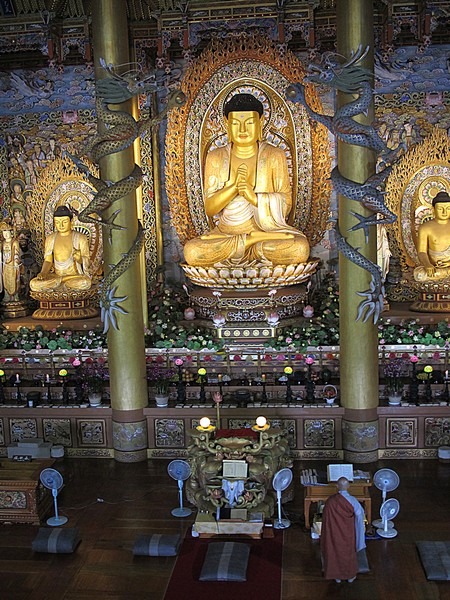

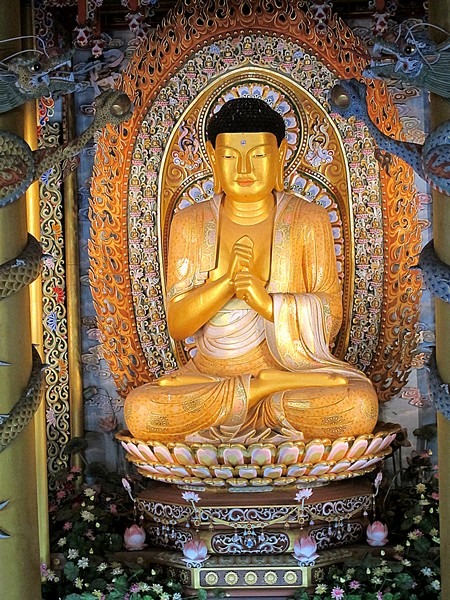
Yakcheonsa (약천사), or Yakcheon Temple sprawls across 122,100 square meters and has the largest Buddhist prayer hall and main temple in Asia. Not only is that pretty spectacular, but inside there are 80,000 golden Buddha statues to see.
What You Can See
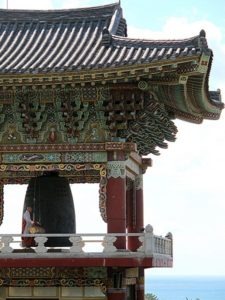
Tourists are a common sight on the grounds and therefore the groundskeepers are very kind and welcoming to those hoping to take a look around, even ushering those unsure inside to take photos. Around the outside of the first floor of the structure are intricately carved window shutters, each featuring a different carving telling a story. After walking around the outside upon entering the main hall is a massive Buddha statue with two more Buddha statues on either side. Dragons encircle golden pillars in the front of the Buddha and the walls are covered with beautifully colored paintings, making it almost a shock to the eyes upon entering with so much to see.
As this past week was Chuseok, or the Korean Thanksgiving, there were quite a few Buddhists inside praying and so I thought I ought not to photograph the scene and disrupt those in worship. That was until I realized there was a staircase that would take me up to the second and then third floor of the building where I had an even better vantage point of the Buddha statues and wouldn’t be intruding on any of the believers down below.

Wonder what all of the colors on a Korean Buddhist temple are for? Wonder what they symbolize? Learn more about dancheong before you go so you can really appreciate everything that you’re seeing at Yakcheonsa Temple.
The second floor had another area for people to pray, though no one was there, and the third floor offered up thousands of small seated Buddhist statues. All of the floors are open to the public and offer great views of the main altar area as well as have their own unique sights to behold.
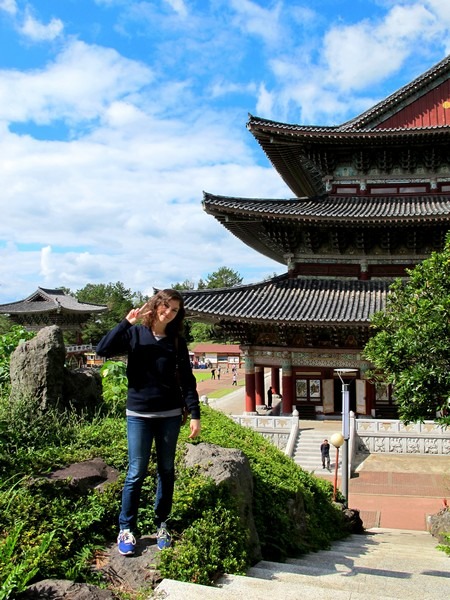
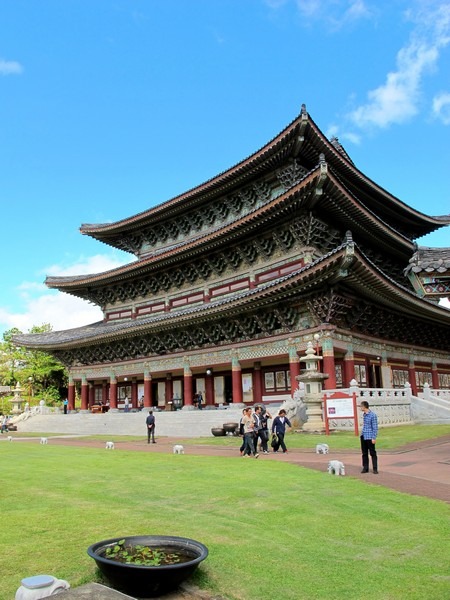
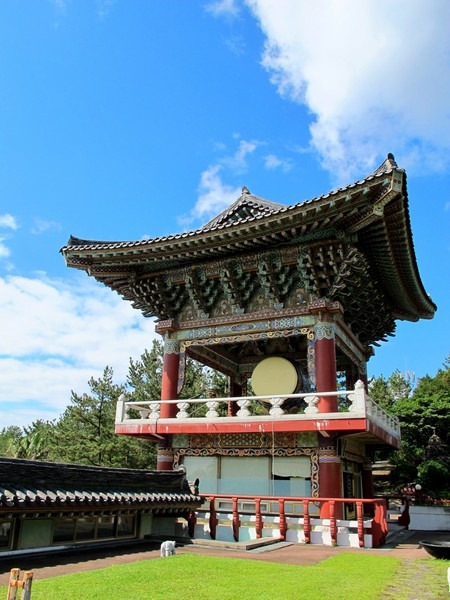
The beautifully manicured lawn in front of the main hall is surrounded by small elephant statues and walking down the path in the center leads down to a pond and then further into an orange and palm tree grove. Flanking the lawn are two structures, one containing a large drum that we were lucky to see pounded by one of the onsite monks in the morning, and the other houses an 18-ton bronze bell. The whole area is colorfully enticing to the eye and well taken care of and a perfect cultural stop on the way to see some of the natural beauty of Jeju’s landscape.
This temple is so large and the grounds so beautiful that it’s almost like walking inside one of the beautiful palace grounds of Seoul. It’s a beautiful stop that I highly recommend while visiting Jeju.
This is just one stop on Jeju Island that should be seen. Down the road is the majestic Jeongbang Waterfall and of course the tallest mountain in Korea is here on Jeju Island as well. Another religious stop would be the mysterious grotto on Sanbang Mountain and don’t miss a trip out to nearby Gapa Island too.
Did you like this post? Pin It!
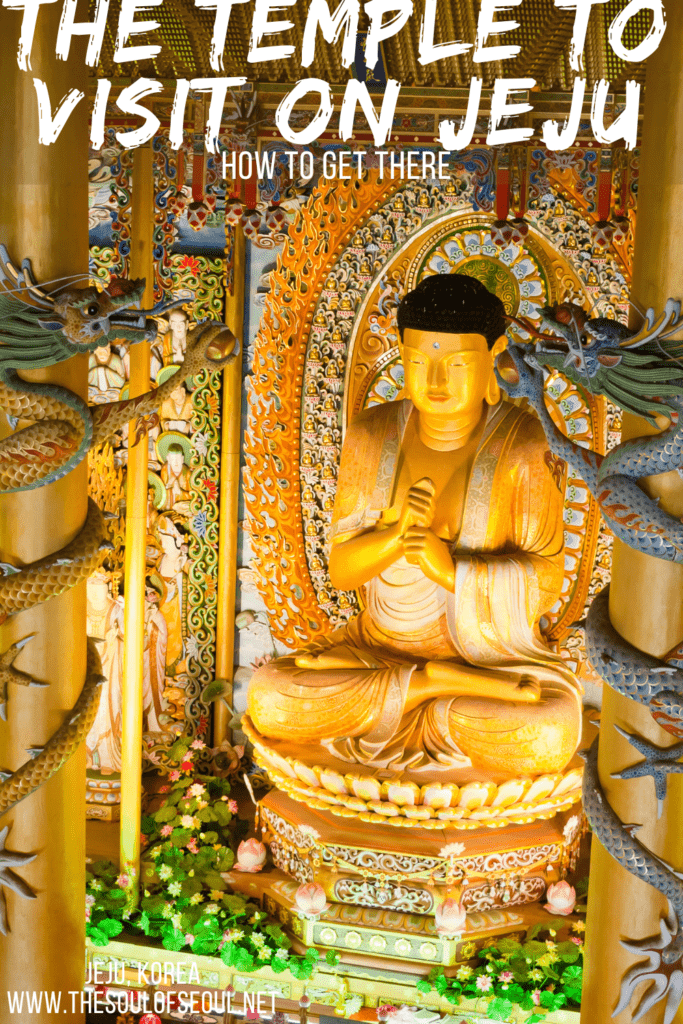
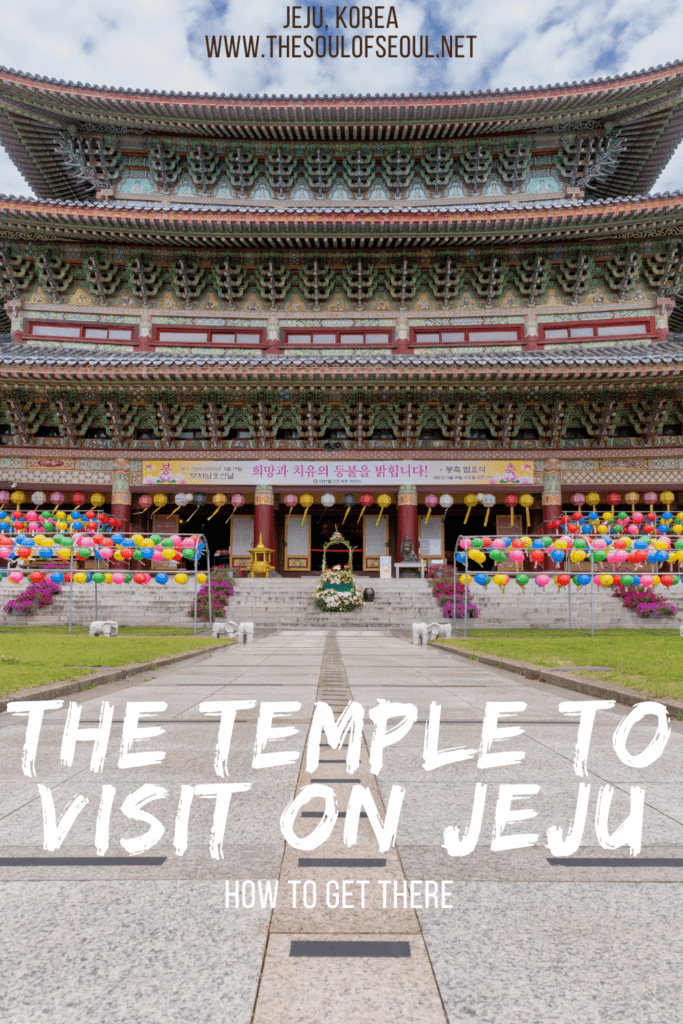
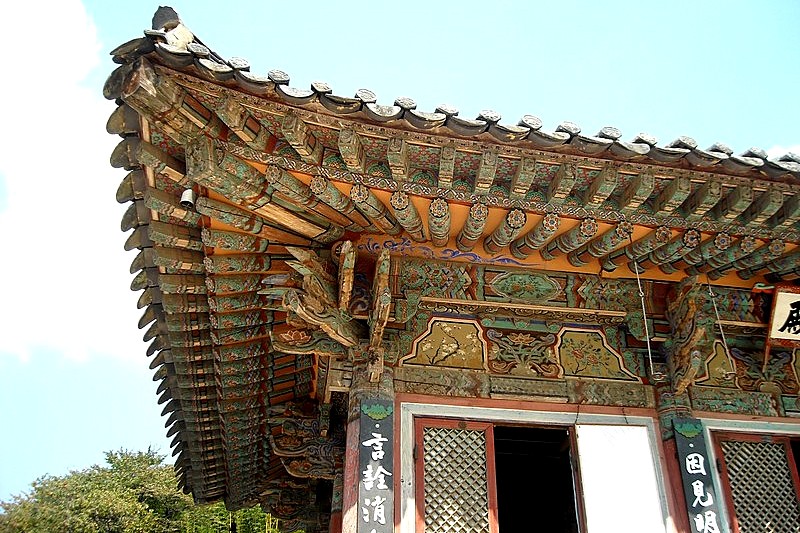
4 Comments
Euphoria Bass
I would love to visit this place. I have been into South Korea for a couple year now, and I can’t believe how much I have been missing from this beautiful paradise. .
Kailee Soul Park
I wish I can visit Seoul Korea. It’s so beautiful there. I really the the temples. So beautiful!
Hallie
The temples are very beautiful. This temple isn’t actually in Seoul though. It’s down south on an island. ^^
crystalshauntae
Isn’t this a beautiful place?! I think its maybe my favorite temple I’ve visited in Korea with the views and orange trees. Loved it!